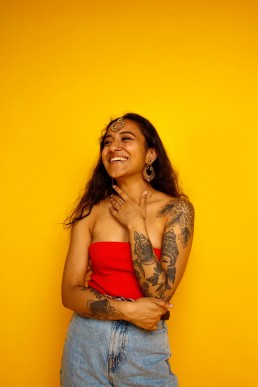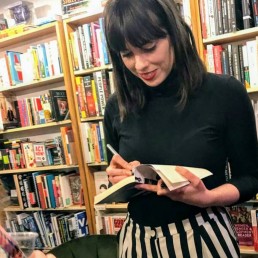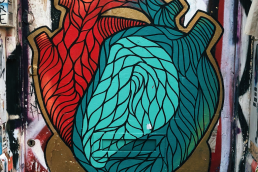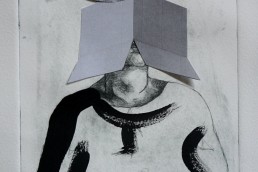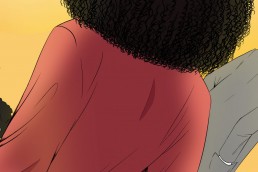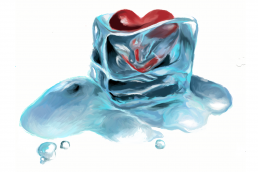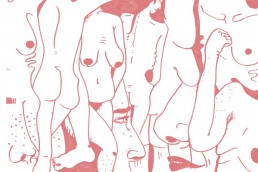By Ellen Desmond
Image courtesy of Heleena Mistry, Francis St Tattoo
Q. We see online that you recently took over the studio where you were apprenticing. Congratulations! This must be a huge step for you. Can you tell us a bit about your story?
A. Thank you! It’s been a long and difficult journey. I decided I wanted to be a tattoo artist when I was 18, and it took me around a year to finally find an apprenticeship after being rejected by most tattoo studios in my hometown of Leicester. Even then I was only an apprentice for three months until my mentor, out of the blue, decided he didn’t want me anymore.
I spiralled into depression, I’d lost my my dream job with no warning, and I’d also been in a car accident where I’d lost my car too. The search began again and I decided to reach out to studios in different cities until I found a studio in London half a year later (again I was rejected by countless studios when I was applying).
When I moved to London my mentor would call me into work once a week if I was lucky, for the rest of the time I was stuck in my tiny bedroom in East London, completely alone. I barely had money to travel as being a tattoo apprentice is an unpaid role. I felt worthless and suffered from depression in silence as I didn’t want people to see me failing in such a big city with so many opportunities. That studio then showed me the same “kindness“ as the previous studio and fired me with no warning.
I’m grateful I’ve had my downfall and I’m proud to have recovered purely on my perseverance and love for tattoos. I was adamant that tattooing is the only career for me, I couldn’t imagine myself doing anything else for the rest of my life.
Q. You are very passionate about breaking taboos around tattoos in South Asian culture. Can you tell us a little bit more about when/why this all began?
A. When I first decided to be a tattoo artist the very first thing I did was try and find any other South Asian tattoo artists. My research got me nowhere. I think I came across one South Asian female artist in the UK. There was a growing number of non-South Asian tattoo artists creating tattoos heavily influenced by traditional Indian artwork, and it broke my heart that there were next to no Indian artists representing their own culture. I decided to take it upon myself to be that change. Not without opposition, people would laugh at me for wanting to be a tattoo artist, I’d been told I was too stuck to my style and to create more westernised pieces. Not to mention the looks and comments I get from other Indians in my community.
Q. Do you think cultural appropriation is a problem within the UK tattooing industry?
A. I think it’s a massive problem. I have no issue with non-South Asians tattooing South Asian artwork provided they respect and understand the culture surrounding the artwork. Most Indian inspired tattoos are used purely for aesthetic purposes, it’s important to be respectful, especially when it comes to religious icons and symbolism.
Q.As a tattoo artist, you probably hear plenty of stories behind people’s tattoos. Do you often notice people getting tattoos that are related to mental health or personal wellbeing?
A. More often than not clients will attach meaning and reasoning for their tattoos. In some cases just the act of them marking their bodies is their way of starting fresh from any personal issues they’ve had. Tattoos are usually seen as quite a rebellious thing, and for some of my clients having a tattoo is part of them rebelling or breaking away from any past ties and restrictions. South Asians can often suffer from a lot of mental health issues as it’s something that’s not talked about in our culture and is often disregarded. I strongly believe the endorphins released by getting a new tattoo can help with those issues and it’s a feeling of release and accomplishment. Getting tattooed can be a painful process, so if you can push through the pain to see something beautiful that’s going to last forever, it’s a great sense of achievement!
You can check out Heleena Mistry’s instagram by clicking here.
Ellen Desmond
Ellen Desmond grew up in Ireland, where she worked at editorial and project management level on various magazines and publications aimed at students. She was awarded the title of Ireland’s Best Student Editor in 2016, just before she moved to Edinburgh to complete an MSc in Publishing. While writing her dissertation, she co-edited and published a popular anthology about bisexuality. She is a passionate intersectional feminist, and an advocate of mental health reform and LGBTQ+ rights.
As Deputy Editor at Fearless Femme, Ellen is responsible for co-ordinating, creating and editing great content, and conducting research on the mental health of young people to support our social mission of breaking down mental health stigma.
In her spare time, Ellen loves reading and trying to prove that she’s read more than you. She also loves activism, art, going to music gigs and, more occasionally, skydiving. She hates oranges and spiders. You can contact her at ellen@fearlessly.co.uk.

